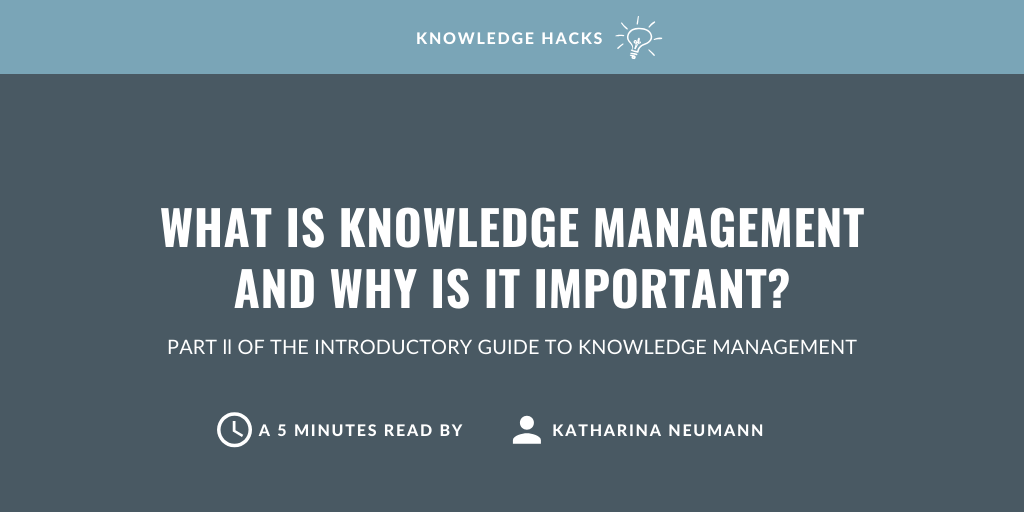It’s “Knowledge Wednesday” again and here comes the second part of my introductory guide to knowledge management. In the first part we have looked into the difference between data, information and knowledge. Within this blog post, I want to cover a question, which you might have already asked yourself, if you have read my two previous blog posts:
What is knowledge management and why is it important?
A quote that immediately became famous and captures in essence potential challenges and advantages of knowledge management goes as follows:
“If only HP knew what HP knows, we would be three-times more productive.”
– Lew Platt, former CEO of Hewlett-Packard
Individual employees possess critical knowledge of a company’s processes, customers, marketing, competition, strategy, and so forth, yet as you might recall from my last blog post on the topic of different forms of knowledge, most of the organizational knowledge is tacit. That means that individual knowledge is not collectively known, which is why employees who leave the company can take a large portion of the organizational knowledge with them. This presents incalculable costs to companies: 53% of respondents to a survey on knowledge-related costs reported that losing key employees amounts to $50K-$299K per employee, while 11% even estimate a loss higher than $1 million (Leonard-Barton et. al.,, 2015). What helps against organizational forgetting is sharing and therefore managing an intangible resource and this is where knowledge management comes into play.
What is knowledge management?
According to Gartner (n.d.), “Knowledge Management (KM) is a business process that formalizes the management and use of an enterprise’s intellectual assets. KM promotes a collaborative and integrative approach to the creation, capture, organization, access, and use of information assets, including the tacit, uncaptured knowledge of people.”
Yet, this does not mean that every single employee needs to have access to all data and information available to the company. It is about selection or put simply: knowledge management makes knowledge available to the right people, at the right time and in the right place.
Knowledge management can take diverse formats such as lessons learnt, knowledge maps, content management systems (CSM), social networks or chatbots – only to name a few and is more than just IT infrastructure. If you want to know more about the different formats and their potential use cases, stay tuned for the next blog posts!
But what are potential key benefits of having a knowledge management system in place? Did you know that Fortune 500 companies loose an estimated $31.5 billion annually due to poor knowledge management (Babcock, 2004)? Apart from the financial benefits, knowledge management also positively influences organizational changes, innovation and employee satisfaction. If you do not want to read any further, please watch the video below, which summarises five key benefits of knowledge management.
Knowledge management …
… speeds up access to information and knowledge: How many times have you heard that you do not need to “reinvent the wheel”? The same is true for knowledge – in most of the cases, the knowledge needed to complete a certain task or project is already there – it just needs to be found. Bothering that one colleague who is always on the move can make you feel like “the annoying person”, yet what other option do you have? With knowledge management employees potentially spend less time on answering repetitive questions.
… reduces failure and the repetition of mistakes: touching a hot stove once is a painful experience for a child, so painful that it will probably never to it again on purpose. Just as a child learns from a painful experience, so do companies – so why making the same mistake twice just because you have forgotten about what you have learnt? Lessons learned or best practices are one of the most powerful knowledge management tools for companies, and sharing them with colleagues from other departments who face similar challenges is advantageous for both sides.
… supports informed decision-making: if you have to take an extremely difficult decision for your life – how do approach this issue? Most people will probably evaluate possible outcomes every decision has and choose the one that best fits their interests. Of course, information generally doesn’t protect you from failure, but it acts as a buffer. The same is true in the corporate context: when employees make use of their shared experiences, lessons learned and other information available to the company, the risk of taking the wrong decision is lower as they can support their argumentation with facts.
… supports better service delivery to employees and customers: starting a new job can be challenging, especially as within the first days one struggles with understanding the bigger picture. It is like to be thrown in at the deep end. Knowledge management helps employees to quicker adapt to the new environment and tasks. Another example where knowledge management supports employees in their daily work is customer service. According to a Gartner study (Maoz, 2014) providing employees or customers with access to contextual knowledge reduces the time to answer by between 20% to 80% and overall customer support costs can be reduced by about 25%.
… promotes change and innovation: Encouraging the sharing of ideas and collaborative work can stimulate innovation and change within a company. I usually develop the best ideas when talking to people i.e. getting inputs, different views and opinions on a topic I am currently thinking about. Does that sound familiar? Or are you more a person that likes to develop ideas on her own?
Now that you know why knowledge management is important, have you ever encountered knowledge management within your work or university life? Does your company take an active approach to managing knowledge?
Let me know your opinion and experiences in the comments below!
Bibliography
Babcock, P. (2004). Shedding Light on Knowledge Management. Retrieved 18 March 2020, from https://www.shrm.org/hr-today/news/hr-magazine/Pages/0504covstory.aspx
Gartner (n.d.) “Knowledge Management (km)”. Retrieved 12 March 2020, from https://www.gartner.com/en/information-technology/glossary/km-knowledge-management
Leonard-Barton, D., Swap, W., & Barton, G. (2015). Critical knowledge transfer. Boston, Massachusetts: Harvard Business Press.
Maoz, M. (2014). Knowledge Management Will Transform CRM Customer Service. Retrieved 18 March 2020, from https://www.gartner.com/en/documents/2677716




Hello Katharina,
Great article once again! I love that this one is getting more concrete on the topic and how it actually can value the professional sphere. Also like the video format, super easy to follow and well-made.
In my past job, knowledge was not well managed, resulting in a lot of time and productivity wasted. That was especially true because the employee turnover was important and they didn’t make sure the leaving employee would share his knowledge with the new one before leaving… this post would have definitely helped them change their game!
See you in next week’s post,
Thanks a lot for your insights, Juliette! As we have learnt in change management, such initiatives have to be supported by a motivated group of employees – so if there is only one single department or a small group of people actually taking knowledge sharing importantly the chances are very low that it becomes a routine. Looking forward to welcome you back on the blog! 🙂
Hello Katharina,
again a very good story about knowledge management. I can fully confirm your theses.
Especially in day-to-day business, it’s important to know how to deal with the existing tools, the knowledge of employees.
Important when changing jobs. Likewise, the cost side for companies. It is not so easy to implement measurable quantities in the company here.
Go ahead, i ‘m already lookin forward to the blog.
Thank you so much for the positive feedback. Indeed loosing knowledge creates huge costs, although most executives are not aware of it because it is not directly measurable (i.e. intangible asset). See you back on the blog next Wednesday!
Very insightful article!!! I experienced the case in many companies I worked for, that key information or best practices were not documented on a regular basis and I found myself asking the same questions all over again.
I personally think that companies are highly interested in keeping the knowledge of their employees but they might have troubles finding a suitable way to provide employees with a platform or tools so they can share their insights in an easy way.
Therefore I am really looking forward to your upcoming post regarding the different formats and use cases 🙂
Hi Stella, indeed it can be very frustrating to not find the information needed to continue with a task at hand. I have also experienced it and it made me feel lost. Within my next blogpost I will talk about some best practices, so stay tuned and hope to welcome you back on my blog, soon!
Hi Katharina, I really like your blog topic! The company I work for has knowledge management pretty well under control. Within the team we have access to our own team-wikki, which we update continuously. I have to admit, that I am a bit more chaotic in private. I am looking forward to learning more about this topic!
Hello Anja, many thanks for sharing your team’s insights to knowledge management – as said, some companies do better than others, and probably yours is a company that operates in a knowledge-intensive environment and therefore needs it to create and sustain its revenue. Within my next posts I will talk about best practices – maybe you will recognise them! Hope to welcome you back on my blog soon!
Hello! Very interesting article, so many small companies that do not value knowledge management should read it! They would definitely change their minds.
Thanks Veronica, for your positive feedback! Stay tuned for more knowledge insights.
I really like the insightful video on knowledge management benefits. I can’t believe it is actually so costly for companies to not manage knowledge properly.
Hi Jenny, right – this was also a surprising fact for me, but also quite shocking. Hope to provide further interesting insights within my nexts posts for you!